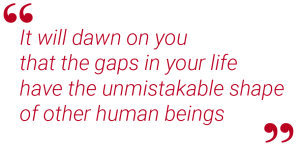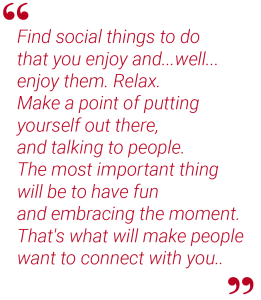
Making friends used to be easy, right?
When I was four years old a Mayflower Moving Co. truck rolled up in front of the empty house across the street and delivered a stocky kid with curly blond hair hanging in his eyes who became my best friend by the time the movers had got the baby elephant-sized TV/stereo console into the living room. We remained bffs through high school until I went off to college and he got married and started a family. For a couple of years, we got together whenever I was back in town but our paths diverged so drastically that eventually, our only connection was a shared past.
 And that's natural. As we get older, our friend circles tend to get thinner for any number of reasons: relocations, the demands of work and relationships, disparities in disposable income or leisure time, petty disagreements or jealousies, ill-advised loans, changes in lifestyle, and just a natural cooling of the social impulse, to name a few.
And that's natural. As we get older, our friend circles tend to get thinner for any number of reasons: relocations, the demands of work and relationships, disparities in disposable income or leisure time, petty disagreements or jealousies, ill-advised loans, changes in lifestyle, and just a natural cooling of the social impulse, to name a few.
Family, work, and life happen.
For many of us, having kids fundamentally changed our social lives. You start hanging out with the other parents rather than the singles if only because your schedules match better and they don't judge you (too harshly) when a three-year-old's full-on snot-slinging meltdown requires a hasty exit. For most folks, this nesting period coincides and in many ways spurs a more serious, careerist attitude toward work life. And let's face it, between the two of those, who really has the energy to get dressed up and go out and spend money you don't have on something as frivolous as a good time with friends?
Then one day, your kids are grown, you've reached the point where work mostly stays at work, and the prospect of another weekend binging take-out Thai and middlebrow BBC costume dramas doesn't have the allure it once did. It will dawn on you that the gaps in your life have the unmistakable shape of other human beings.
In short, a friend or two would be welcome. But how do you go about finding them? Everyone says making friends as an adult isn't as easy as it was when we were kids. Maybe. Maybe not. Below, you will find some basic steps you can take to make your social life more satisfying.
 First steps
First steps
Make some lists: This sounds kind of silly, but do it anyway. It will help clarify what you're looking for and suggest directions you can take.
- Make a list of all your current friends. Chances are good that you owe some of them a call or text. Do it. Do it now.
- Make a list of friends that you have lost track of over the years. How far back you go is entirely up to you.
- List at least five things that make you happy or that you're passionate about.
- List at least five things you are interested in, but have little or no experience with.
Reuse, Recycle, Reconnect.
A really good place to start, especially for those who are out of practice, is to reconnect with old friends. Instead of building a friendship from the ground up, try renovating old ones. Social media makes this much easier than it used to be. Online chats are low-risk and can be a lot of fun. If nothing else you get to remind each other of embarrassing incidents from the past and some of your more regrettable hairstyles.
Forgive and forget, or ask for forgiveness: Some friendships die because one person said or did something the other couldn't abide, but a lot of times it was something small...petty, even, and many more times it wasn't even that. It was just not bothering to pick up the phone for too long. Now is a good time to mend some fences. If nothing else comes of it, you have a few less low-grade regrets gnawing on your conscience when you lie awake at 3 a.m.
ProTip: Don't overshare or overstay the first time you reach out to someone online. Keep things relatively light. End on a LOL. Make an excuse to sign off and ask if they mind if you reach out again sometime soon. If they're up for it. Do it. (rebuilding friendships takes time and even more importantly: follow through).
Make a point of upkeep: Once you've reconnected, maintain those connections. Reach out via text or phone call and touch base periodically.
 Ready-made groups
Ready-made groups
You are unique, but you're not that unique: Over 7 million people live in Greater Houston. Chances are very good that there are more than a few who share your interests. Take one item from each list and look for ways to pursue them that have a social element. Here are some good places to start.
- Volunteer: non-profits of all kinds are always in need of volunteers. Start with organizations or causes you already support because chances are good you will find like-minded people. Here are some good places to start Volunteer Houston | Volunteer Match or just search the web for specific organizations or interest areas.
- Join a sports league or exercise group: team sports are great community builders, but there are things like walking, hiking, running and biking groups for all levels in your area.
- Take a class: have you always wanted to try your hand a pottery or poetry? Asian cooking? Woodworking? Chances are pretty good, you can find a class to learn more.
- Join a book club: HCPL branches host a variety of book clubs for all types of readers: general interest, mystery, sci-fi and more.
- Facebook Groups
- Join or rejoin a church
- Friendship apps:
- Meetup - A simple way to join a like-minded social circle
- Bumble BFF for women to meet women simply wanting friends
- NextDoor - Start close to home! This is your window to everything happening in your neighborhood: block events, furniture swaps, community events, etc.
- Many more.
Next steps
Keep it low-key at first: It's best to start a potential friendship with low-pressure, low-risk plans that offer an easy out for both of you if you don't click: grab a coffee, go shopping or antiquing, go for a walk or bike ride at a local park, meet up at the gym, meet at a sports bar to watch a game, get pedicures. In short, anything that doesn't require a large investment of time or money.
Say yes. When it comes to invitations, even casual "hey, we should get together sometime" ones, you've got to put away your social anxiety, fear of commitment and anything else that holds you back from making connections. In short, say 'yes' and follow through. If you're the type who never joins your coworkers at happy hour. Change that.
Be willing to work on yourself: Let's face it, many of us have built up some habits and attitudes that don't lend well to social situations. We may have to change some things about ourselves. But don't use this as an excuse. ("I'll get myself right first, then I'll try..."), but embrace the idea of personal growth. It might be as simple as making a concerted effort to stay in touch. It might mean whittling away a little of the crust of cynicism that has built up over the years.
 What I learned
What I learned
Don't go looking for a BFF. If it happens, that's great, but it's better to throw your net wider. Cultivate friendships with many people. They don't all have to be the person you confide your deepest fears to. People who you can just meet up with and laugh are great. Folks who share your interest in antiquing or hiking, or DIY home improvement or comic books are too. There are different levels of friendship, Sometimes it grows and deepens. Other times not. That is okay!
Understand that social media has changed the way friendship looks. With social media, people have good, mutually satisfying friendships and rarely if ever are in the same room or even the same time zone. Texting, messenger apps, video calls and the like make it possible to keep up a lively connection. Use them! Ideally, you are aiming for a mix of IRL and online friendships.
The parallels to dating will hit you...hard: Many of the things that we all hated about dating will be in play when looking for purely platonic friendships. There's the risk of rejection, people who look good on paper, but turn out to be incompatible, awkward silences, the feeling that you need to be 'on' rather than your authentic self, and people you really feel a connection with who don't feel the same way about you.
Just like dating, interactions tend to have better outcomes when they happen naturally and with little or no expectations that they will go beyond an interesting and engaging conversation.
Rejections aren't necessarily about you: You, in all probability, are going to talk to someone with whom you share a lot in common--sense of humor, taste in music, hatred for the Dallas Cowboys. But no matter how many different gambits you try, they never accept your overtures. If you're like me, your instinctive response will be to dig a hole in which to crawl with a half gallon of Blue Bell Sea Salt Caramel and the TV remote. Don't. You can't let it get to you. The fact is you don't really have any idea why they demurred. Chances are good though that the reasons have little to do with you as a person. People can be risk-averse. People can be busy. People can be going through things. People can be introverts. People can make snap judgments about others that are just plain wrong. Just move on.
There is no timeline. There is no quota: If you're at all like me, you will want to see results immediately. You'll start planning a Super Bowl party to invite all your new friends before you've made any. Don't. Find social things to do that you enjoy and...well...enjoy them. Relax. Keep friendship expectations low, but make a point of putting yourself out there and talking to people. The most important thing is to have fun by embracing the moment. That will make people want to connect with you. That is what will make things happen.



Add a comment to: How to Make Friends Later in Life